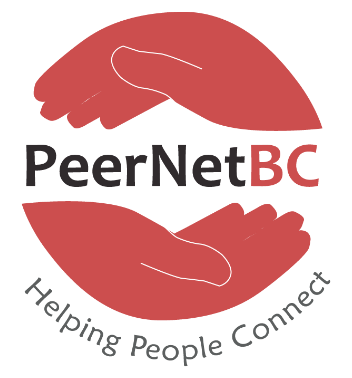PeerNetBC’s five key values guide us in our work and the ways we engage with people. Not only do they guide our resources, workshops, and custom content, they are also the core of how our organization operates. Their definitions are dynamic and continue to change as we learn (and unlearn). Our key values are: being peer-led, embracing capacity building, working together, and reimagining the facilitator’s role. We practice all of these with an anti-oppressive and de-colonizing lens.
What does it mean to be peer-led?
In peer-led groups, people come together because of a common experience, identity, interest, or concern. share responsibility for the group’s direction and wellbeing. While facilitators may help guide the group, the participants are the decision-makers and each member’s knowledge, ideas and lived experience are valued.
Within each group, there may be differences in lived experience and access to systemic privilege. For example, two people may be peers as 2SLGBTQA+ folx, while experiencing different oppressions based on gender identity, race, ability, or class. Because these differences exist, we are careful to balance the value of being “Peer-Led” with other PeerNetBC values.
What is capacity-building?
Simply put, capacity building is the realization of our abilities and skills. PeerNetBC helps groups and organizations build capacity by providing workshops, resources, consultation, and support that enable them to strengthen their connections and to do their work more effectively. This can entail supporting groups to gain new skills or create new processes, unlearn or shift practices, or strengthen the use of existing knowledge and tools. See us do this in action in one of our standard or custom workshops.
How do we work together?
Relationships and collaboration are an essential part of our work at PeerNetBC. We strive to always be informed by our relationships with partners, collaborators, funders, and community members and, whenever possible, work with communities rather than for them. We seek to recognize and work at levelling power imbalances and promote equity and justice when bringing different communities and partners to work together.
What is the facilitator’s role?
At PeerNetBC, we believe that a facilitator’s role is to draw knowledge and insight from group members, creating a space for sharing and connection where they can build collective wisdom and make decisions together. Using skills, tools, and exercises, a PeerNetBC facilitator strives to keep a group discussion moving as smoothly, safely and equitably as possible. Our role is not to make the decisions for the group or be the sole provider of knowledge but rather to make sure that all participants have a chance to express their ideas and feelings while maintaining the intention of the session or group.
What is an anti-oppressive & decolonizing lens/framework?
Oppression is the use of power to disempower, marginalize, silence or otherwise subordinate one group of people while empowering or privileging another group. Oppressions, (such as racism, classism, , sexism, heterosexism, transphobia, and ableism)function on both systemic (institutional, political, economic, etc.) and interpersonal (interactions between individuals) levels. The experience of oppression is often internalized, leading people to self-censor or self-criticize.
An anti-oppressive lens seeks to recognize the oppression that exists in our relationships and society while working to mitigate their effects and shift power imbalances in our communities and the world. Anti-oppression is often also referred to as social justice, diversity and inclusion, or equity.
Colonization involves one group taking control of the people, lands, and resources of another group, often through the use of violence, including the suppression of languages, cultural practices, and political, economic, spiritual and social systems and sometimes includes genocide. Colonization on Turtle Island (North America) is both historical and ongoing as European peoples and systems attempt to erase and remove Indigenous peoples who have lived on and stewarded these lands since time immemorial.
Decolonization is the process of unlearning and dismantling the effects of colonization and European centric worldviews on our minds, communities, and societies. Decolonization is often linked with Indigenous resurgence, Indigenization, diversity, equity and anti-oppression work.
At PeerNetBC, we strive to use a decolonizing and anti-oppressive lens in all of the work that we do. Doing land acknowledgements and creating space for folks involved in our workshops and events to share pronouns and access needs are just some of the ways that we incorporate these lenses into our work.
